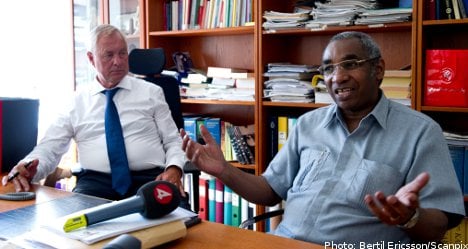“I cried for the first time in my life. It is a miracle and proof that the justice system works,” 54-year-old Sylvere Ahorugeze said after the court’s decision, which reverses a previous ruling.
Ahorugeze is suspected of having been one of the leaders of the Hutu extremists involved in the genocide of around 800,000 people, mostly minority Tutsis, and stands accused of murdering 28 Tutsis in a suburb of Kigali on April 7th, 1994.
He was arrested in July 2008 after being recognised at a visit to the Rwandan embassy in Stockholm while living as a refugee in neighbouring Denmark.
Rwanda requested his extradition a month later.
Ahorugeze on Tuesday emphasised his denials of the allegations in Rwanda, claiming that he is the victim of a “political conspiracy”.
“I have nothing to hide. I know that I have done nothing wrong,” he said.
The 54-year-old’s lawyer Hans Bredberg said that his client plans to seek damages for the time he has spent in custody.
“Three years have been taken from his life. Imagine sitting in a cell 23 hours a day without information.”
The Supreme Court on Wednesday reversed a decision taken in November 2010 to keep the man in custody.
A year after Ahorugeze’s arrest Sweden decided to send him back to Rwanda to face prosecution, but suspended the extradition following a request by the European Court of Human Rights, amid concerns over the central African nation’s rights record and the independence of its judiciary.
Wednesday’s decision has no bearing on the underlying issue of the charges Ahorugeze faces and is simply a ruling on whether he should be held in custody pending a final decision on his extradition.
The court ruled that it is not reasonable for Ahorugeze to be held in custody for such an extended period of time.
Ahorugeze expressed his intention to return to his family in Denmark on Wednesday. If he were to remain in Denmark then Sweden would not be able to complete his extradition to Rwanda if such a decision were to be taken.
Extradition from Denmark to Sweden can only be sought if any suspected offences occurred in Sweden and can not be sought for the purpose of simply extraditing a person to a third country.
Rwandan authorities would in that case have to seek extradition directly from Denmark.
Sweden’s justice minister Beatrice Ask on Wednesday declined to comment on the court’s decision, preferring to wait until she had received the ruling in full.



 Please whitelist us to continue reading.
Please whitelist us to continue reading.
Member comments